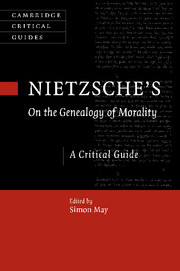Book contents
- Frontmatter
- Contents
- Contributors
- Acknowledgements
- Note on texts, translations, and references
- Introduction
- Chapter 1 The future of evil
- Chapter 2 On the nobility of Nietzsche’s priests
- Chapter 3 The genealogy of guilt
- Chapter 4 Why Nietzsche is still in the morality game
- Chapter 5 Who is the “sovereign individual”? Nietzsche on freedom
- Chapter 6 Ressentiment and morality
- Chapter 7 The role of life in the Genealogy
- Chapter 8 The relevance of history for moral philosophy
- Chapter 9 Why would master morality surrender its power?
- Chapter 10 “Genealogy” and the Genealogy
- Chapter 11 The promising animal
- Chapter 12 Nietzsche and the “aesthetics of character”
- Chapter 13 Nietzsche and the virtues of mature egoism
- Chapter 14 Une promesse de bonheur? Beauty in the Genealogy
- Bibliography
- Index
Chapter 2 - On the nobility of Nietzsche’s priests
Published online by Cambridge University Press: 05 November 2011
- Frontmatter
- Contents
- Contributors
- Acknowledgements
- Note on texts, translations, and references
- Introduction
- Chapter 1 The future of evil
- Chapter 2 On the nobility of Nietzsche’s priests
- Chapter 3 The genealogy of guilt
- Chapter 4 Why Nietzsche is still in the morality game
- Chapter 5 Who is the “sovereign individual”? Nietzsche on freedom
- Chapter 6 Ressentiment and morality
- Chapter 7 The role of life in the Genealogy
- Chapter 8 The relevance of history for moral philosophy
- Chapter 9 Why would master morality surrender its power?
- Chapter 10 “Genealogy” and the Genealogy
- Chapter 11 The promising animal
- Chapter 12 Nietzsche and the “aesthetics of character”
- Chapter 13 Nietzsche and the virtues of mature egoism
- Chapter 14 Une promesse de bonheur? Beauty in the Genealogy
- Bibliography
- Index
Summary
This chapter aims to make a limited exegetical point about the first essay of On the Genealogy of Morality (GM), and then to trace its consequences for Nietzsche’s argument about the historical transformation that produced our current altruistic morality. The textual point is this: the priests who figure importantly in Nietzsche’s story are intended to be unambiguous instances of the noble character type; they are not to be understood as slaves, or as inhabiting any ambiguous, intermediate type between noble and slave. My claim is not new. At least in the context of the first essay, it is a fairly straightforward textual observation, and it has been marked by commentators (more or less) in passing, with a fair frequency (see e.g. Deleuze [1962] 1983: 126; Nehamas 1985: 121, 120–26; Migotti 1998: 755–56; Ridley 1998a: 44–45; May 1999: 46; Wallace 2007: 122–24; Conway 2008: 33). More importantly, Bernard Reginster (1997) relied on the observation to do crucial argumentative work in his path-breaking account of ressentiment in GM, I, which lies in the background of the interpretation I will offer here. Nevertheless, there remains a tendency to overlook the nobility of Nietzsche’s priests. Our students routinely make the mistake, and even insightful readers of Nietzsche are occasionally drawn into it.
The reasons for oversight here are not far to seek. Classifying the priests as nobles can seem anomalous, given a common account of what is on offer in the first essay. The standard story – it is so standard that it amounts to what “everybody knows” about GM, I – begins from Nietzsche’s claims about a “slave revolt in morality” (GM, I, 7, 10, et passim). Altruistic morality is supposed to have arisen through a revolution against a previously existing “noble pattern of values” that glorified the typical character traits of some privileged class. According to the story, those who were devalued under the “noble” values – the weak, the dispossessed, the “slaves” – resented the privileged class, but, being weak, they lacked the means to strike back at the nobles in any direct way. Eventually, they found a way to revenge themselves indirectly, by undermining the basic pattern of values under which the noble way of life was glorified. The resulting “slave revolt” replaced noble values with something close to our current altruistic morality – a set of values demanding respect for the interests of others and equal consideration for all. Morality as we have inherited it is therefore to be understood as a “slave morality,” invented in pursuit of this program of “revaluation” (GM, I, 7) and motivated by the vengeful desire to deprive nobles of any good conscience in the enjoyment of their privileges and characteristic virtues.
- Type
- Chapter
- Information
- Nietzsche's On the Genealogy of MoralityA Critical Guide, pp. 24 - 55Publisher: Cambridge University PressPrint publication year: 2011
- 13
- Cited by

